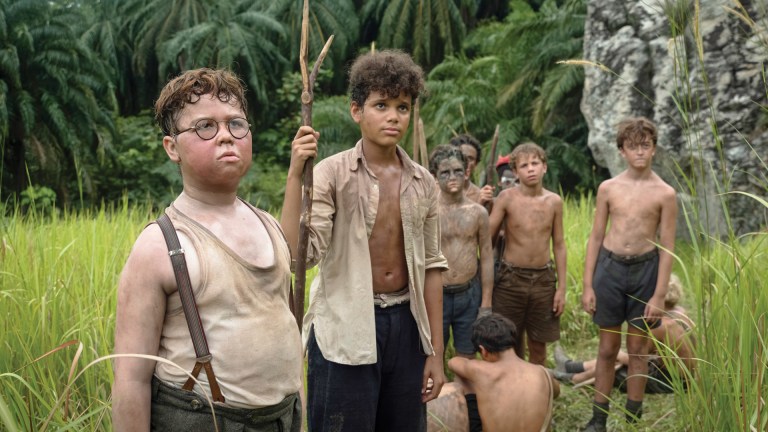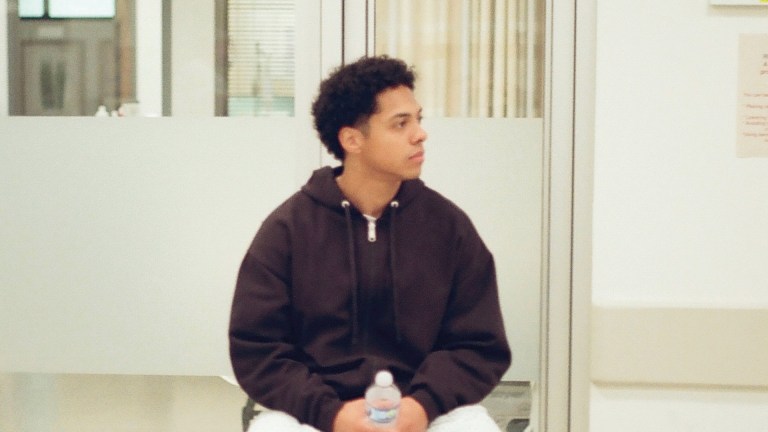Screenwriter Davies has added a sexual frisson as well. “We really muddy it up. I wasn’t interested in playing a villain,” says Oyelowo. “It would get very dull if I was twirling my moustache and constantly doing something dastardly for six hours. I don’t think that would be paying homage to the levels of humanity that Victor Hugo manages to get into this novel.
“And Javert is always played posh, which is incredibly lazy. Because he is not. As Hugo clearly states, he was born in a prison, he is working class, he is a prison guard.”
The man is so alone we don’t see any level of human contact that even hints at an ability to connect
And the repressed sexuality that Davies teases us about at the screening? “It is in there, but not something we dwell on. The man is so alone we don’t see any level of human contact that even hints at an ability to connect. Javert can come across as asexual, because he is so consumed by his desire to combat what he deems to be criminality. It is what he has dedicated his life to.
“Javert doesn’t have the luxury to legislate what is right or wrong. You steal a loaf of bread, you go to jail.
“Now, should Jean Valjean be there for 19 years? I would argue not. But considering his upbringing, there is something admirable about a man who decides to fight for the law.
“My hope is that people will not necessarily empathise, but they may find just a few minutes within the six hours where they sympathise with who Javert is and what he does.”
Advertising helps fund Big Issue’s mission to end poverty
In the intervening decade since Small Island, Oyelowo moved to LA, become a US citizen and appeared in films including Lincoln, The Paperboy, The Butler and Jack Reacher.
Then came his performance as Martin Luther King Jr in Ava DuVernay’s Selma for which he won plaudits galore but, mystifyingly, was snubbed at the Oscars. He expresses no bitterness about it, but he does admit that he finds it “very nice to be back on the Beeb, and with a show I am really proud of”.
The story is set two decades after the French Revolution, by which time the promise of liberté, égalité, fraternité was already turning to merde. The extremes of wealth and poverty had only become starker. Paris was burning. And people like Jean Valjean were criminalised simply for being poor.
“The revolution was born out of the haves and have nots being such extremes. But the unrest that caused the revolution continued to burn under the surface,” says Oyelowo. “And if you look at the protests and marches and disquiet we are seeing, both in America where I live and here, the women’s marches, marches for gun control, against terrorism, against war, against Brexit, against Trump, there are people on the streets of France as we speak. You can transpose a lot of the unrest now onto what was going on then.
“It is the criminalisation and marginalisation of the poor and of minorities. It is the abuse of power.”
What does it take to bring Oyelowo onto the street, protesting? “Racial inequalities and any kind of marginalisation of people on the basis of who and what they are. Although,” he adds, “I try to be a doer not a talker. So there are causes I fight for in ways I don’t need to beat the drum about. It is all about trying to effect real change. Especially as I have been afforded a certain platform that means I can do that.
Advertising helps fund Big Issue’s mission to end poverty
My attitude is that I would rather put a little drop in the ocean of the problem than sit back and cry over how vast this ocean is.
Oyelowo is not, he says, an avid reader, but devoured Hugo’s mighty novel in its entirety. Given the times we are living through, the love and idealism, hope and redemption described could be pretty useful.
“They are not only useful, they are absolute necessities,” says Oyelowo. “They are the core of who we actually are. When you look at Jean Valjean, at Cosette, at Fantine, who have such a goodness about them, they are the pinprick of light in the darkness. I think that is why the story is so enduring.”
I wonder the degree to which his politics inform the roles he takes and the projects
he produces. “My politics is very much informed by my morality, my spirituality,” he says. “So the way I live, the way I vote, the work I do is all born out of my faith as well. You know, love God, love one another. It is as simple as that. The gospel is boiled down to that.”
Or, as it says in Les Misérables, “To love another person is to see the face of God”?
“Exactly, And that really, is why I wanted to do it. The journey Jean Valjean goes on is so biblical, I think it is a deeply spiritual piece.”
Les Misérables starts on BBC One on 9pm on December 30
Advertising helps fund Big Issue’s mission to end poverty









